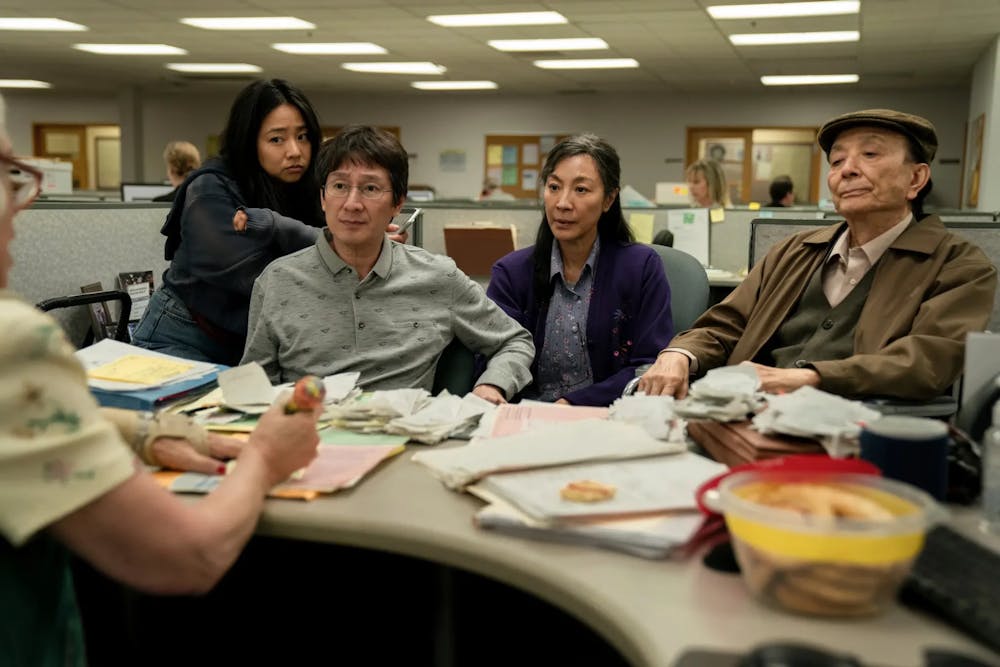A24’s “Everything Everywhere All At Once” is, as its title suggests, a lot of things. It’s a domestic dramedy featuring an immigrant family as its nuclear core, a flashy martial arts action movie crammed with plenty of slow-motion kick shots and a tearjerking story of a mother-daughter reconciliation. It’s also an absurdist meditation on the meaning of life and love. Chinese American immigrant Evelyn Wang (played by Michelle Yeoh) runs a financially-struggling laundromat with her husband, Waymond. The opening scenes of the film are immediately ones of chaos: the business is undergoing an IRS audit, Waymond is trying to serve Evelyn divorce papers, Evelyn’s father — demanding, dissatisfied — has just come from Hong Kong and her daughter, Joy, has been trying to get her traditional Asian family to accept her homosexuality.
Events further spiral when in the elevator ride up to the IRS meeting, Waymond’s body is taken over by an alternate version of himself — Alpha Waymond, from a universe he terms the “Alphaverse.” There, Alpha Evelyn has invented a technology known as “verse jumping,” allowing individuals to access the skills and knowledge of their alternative universe counterparts, made from every other choice that could’ve been made across time. Having sensed a talent for verse-jumping in Alpha Joy, Alpha Evelyn pushed her daughter to undergo extensive verse-jumps, resulting in her mind fragmenting; Alpha Joy now experiences every universe simultaneously, allowing her to manipulate space, time and matter around her freely. Returning as Jobu Tupaki, a god-like figure, she has created a black hole-type singularity she calls the “everything bagel,” which is threatening to consume the multiverse — worse, she seems hell-bent on pursuing this universe’s Evelyn, ostensibly to kill her like her predecessors.
To escape her, Evelyn learns how to verse-jump. She enters universes where she flips signs, works as a teppanyaki chef and even one where she has hotdogs instead of fingers. She sees the life she could’ve lived if she hadn’t left Hong Kong with Waymond — becoming a kung fu master and movie star, while the latter becomes an elite businessman. And through it, she begins to develop the sense that nothing truly matters … just like Jobu Tupaki, who she learns actually made the “everything bagel” to see if she could wipe herself from existence.
Evelyn almost joins her in the bagel, too — but it’s Waymond, across the universes, who stops her. In the kung fu universe, freshly converted to nihilism, she approaches him in an alleyway, asking angrily, “You want to know what would have happened [if we immigrated together]? We’d wake up every day in a tiny apartment … over a failing laundromat.”
What follows is the pivotal point of the film, Businessman Waymond’s response: “All of those years ago, when we first fell in love, your father would say I was too sweet for my own good. Maybe he was right … So even though you have broken my heart yet again, I wanted to say… In another life, I would have really liked just doing laundry and taxes with you.”
Through this scene, the Evelyn-Waymond relationship rewrites itself; from the mundane and distinctly Asian immigrant, which originally appeared to rob the two of their potential for glitz and glamor, emerges the foundation for romance. Waymond covets the life he has with Evelyn in the original universe, despite seeming to be the pinnacle of success in this one. Through the subversion of our expectations and societal standards, he presents a philosophical antidote to the nihilistic pull of the first half of the film. It’s this side of Waymond that inspires Evelyn to appeal to Jobu Tupaki through understanding and kindness. And it’s then that a new interpretation of the movie can arise.
Verse-jumping, mind fragmentation and the nihilism experienced by Jobu Tupaki all become metaphors for being terminally online, internet overload and the nihilism of 21st century post-modern culture. In “Everything Everywhere All At Once,” we see a dramaticized version of a parent or loved one of an older generation in Evelyn, reliving our lived experiences — truly, fully understanding us. Sifting through all that “noise” to understand how much we desire their approval, their love, remembering all the losses of opportunities they’ve experienced along the way for us and still being able to say:
“And no matter what, I still want to be here with you. I will always, always want to be here with you.”
To all my fellow moviegoers who felt personally moved by the lines quoted above, who still find sentimental beauty in their expressions of love, I feel relief. It seems to me that Generation Z nihilism can’t be totalized if there’s a part of us that still cares, that still feels a tenderness for fictionalized characters on big screens.
Writing as a first-generation Asian-American, what makes the film so cathartic for audiences of my diaspora is how it renders the unspoken explicit, how it translates Asian love into one undeniable by an American metric. Waymond loves Evelyn, Evelyn loves Joy. “Everything Everywhere All At Once” promises a unity of culture and identities, as well as the intelligibility and validity of the specifically Asian-American, metaphorically transcending its own hyphen.
This screening of ‘Everything Everywhere All At Once’ was made possible through DUU Freewater Presentations and Duke ASA. These events are organized by Duke students for Duke students and are completely free to attend. A calendar of future events can be found here.
Get The Chronicle straight to your inbox
Sign up for our weekly newsletter. Cancel at any time.

